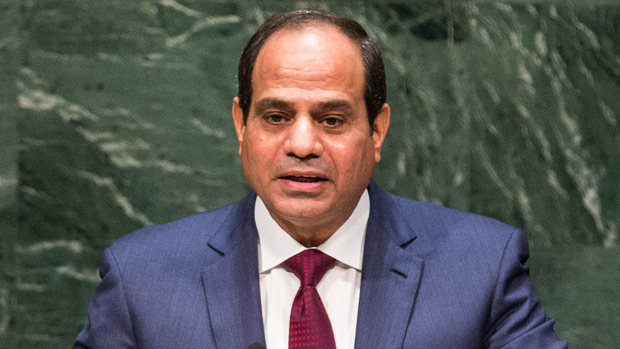Sinai attacks: Islamist militants kill 26 in Egyptian peninsula
Group which pledged allegiance to Islamic State carried out simultaneous attacks on military targets

A free daily email with the biggest news stories of the day – and the best features from TheWeek.com
You are now subscribed
Your newsletter sign-up was successful
A series of simultaneous attacks by Islamist militants in Egypt's Sinai Peninsula have left at least 26 people dead, many of them soldiers.
"Terrorist elements have attacked several police and army headquarters and facilities using explosive-laden vehicles and rockets," the Egyptian military told Al Jazeera.
A group known as the Sinai Province of the Islamic State claimed responsibility for the attack on Twitter. Its leaders were originally inspired by al-Qaeda, but have since pledged allegiance to IS and are calling on the public to rebel against President Abdul Fattah al-Sisi (above).
The Week
Escape your echo chamber. Get the facts behind the news, plus analysis from multiple perspectives.

Sign up for The Week's Free Newsletters
From our morning news briefing to a weekly Good News Newsletter, get the best of The Week delivered directly to your inbox.
From our morning news briefing to a weekly Good News Newsletter, get the best of The Week delivered directly to your inbox.
The attacks, which were "the most complicated and widely coordinated" terrorist attacks in Egypt in recent years targeted key military points in the provincial capital El-Arish and the town of Sheik Zuwayid and Rafah, according to the New York Times. One of the offices of Egypt's flagship state newspaper, Al Ahram was also struck during the attack.
There is an ongoing insurgency in the north east peninsula, with the number of attacks intensifying since the ousting of President Mohammed Morsi in 2013. Yesterday's attack was the deadliest since insurgents killed 31 people at a military checkpoint in October.
Washington has condemned the attacks saying it remained "steadfast in its support of the Egyptian government's efforts to combat the threat of terrorism".
Following October's attack, the military responded by imposing a state of emergency in the region, demolishing 800 homes in the border town of Rafa and imposing strict curfews.
A free daily email with the biggest news stories of the day – and the best features from TheWeek.com
"They have displaced a lot of people, and that undoubtedly creates a lot of resentment and increases the atmosphere of permissiveness for this kind of violence," said Tamara Cofman Wittes, director of the Center for Middle East Policy at the Brookings Institution in Washington.
The latest attacks "mean that the military does not control Sinai, as it claims," said Professor Khalil al-Anani, a US-based academic and expert on extremism. "The insurgency is getting stronger and stronger, and the government's strategy is a failure."
-
 Epstein files topple law CEO, roil UK government
Epstein files topple law CEO, roil UK governmentSpeed Read Peter Mandelson, Britain’s former ambassador to the US, is caught up in the scandal
-
 Iran and US prepare to meet after skirmishes
Iran and US prepare to meet after skirmishesSpeed Read The incident comes amid heightened tensions in the Middle East
-
 Israel retrieves final hostage’s body from Gaza
Israel retrieves final hostage’s body from GazaSpeed Read The 24-year-old police officer was killed during the initial Hamas attack
-
 China’s Xi targets top general in growing purge
China’s Xi targets top general in growing purgeSpeed Read Zhang Youxia is being investigated over ‘grave violations’ of the law
-
 Panama and Canada are negotiating over a crucial copper mine
Panama and Canada are negotiating over a crucial copper mineIn the Spotlight Panama is set to make a final decision on the mine this summer
-
 Why Greenland’s natural resources are nearly impossible to mine
Why Greenland’s natural resources are nearly impossible to mineThe Explainer The country’s natural landscape makes the task extremely difficult
-
 Iran cuts internet as protests escalate
Iran cuts internet as protests escalateSpeed Reada Government buildings across the country have been set on fire
-
 US nabs ‘shadow’ tanker claimed by Russia
US nabs ‘shadow’ tanker claimed by RussiaSpeed Read The ship was one of two vessels seized by the US military


